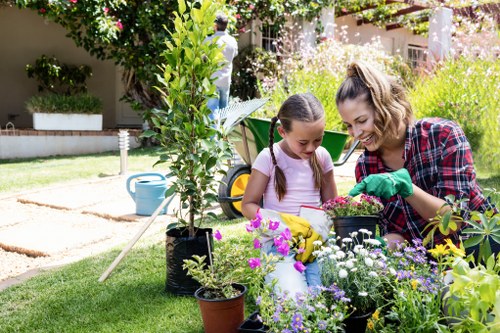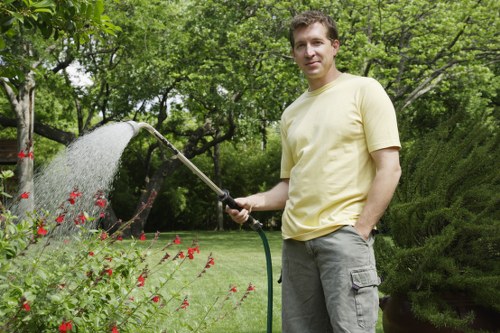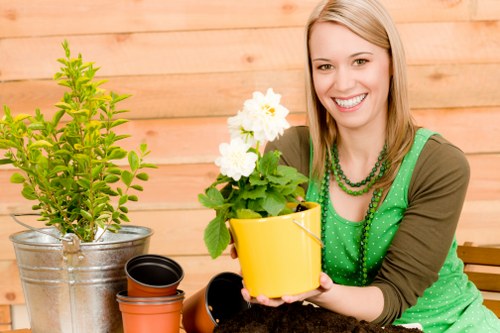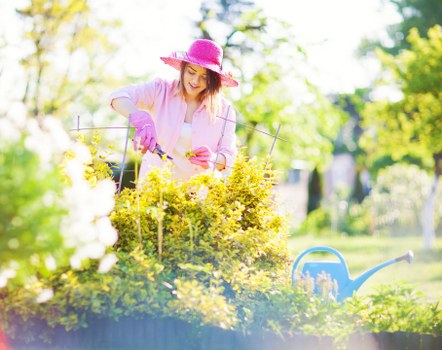Garden Maintenance in Penge: Expert Tips and Services for a Beautiful Garden

Maintaining a beautiful garden in Penge requires dedication, knowledge, and the right set of tools. Whether you're a seasoned gardener or a novice, understanding the basics of garden maintenance can transform your outdoor space into a vibrant and thriving sanctuary.
In this comprehensive guide, we'll explore various aspects of garden maintenance specific to the Penge area. From soil preparation to seasonal planting, we'll cover everything you need to ensure your garden remains healthy and attractive all year round.
One of the first steps in effective garden maintenance is understanding the local climate. Penge enjoys a temperate climate, which means moderate rainfall and mild temperatures. This provides an ideal environment for a wide variety of plants, but it also comes with its own set of challenges.

The Importance of Regular Garden Maintenance
Regular garden maintenance is essential for several reasons. It not only enhances the aesthetic appeal of your property but also promotes the health and longevity of your plants. By staying on top of routine tasks, you can prevent common issues such as pests, diseases, and overgrowth.
Moreover, a well-maintained garden can increase the value of your home and provide a serene environment for relaxation and recreation. Whether you're hosting gatherings or simply enjoying a quiet evening outdoors, a beautiful garden adds significant value to your lifestyle.
In Penge, where community and green spaces are highly valued, maintaining your garden can also contribute to the overall beauty and appeal of the neighborhood. It's a way to show pride in your home and contribute to the community's aesthetic standards.

Essential Garden Maintenance Tasks
To keep your garden in top shape, it's important to establish a routine that includes the following essential tasks:
- Weeding: Regularly removing weeds prevents them from competing with your plants for nutrients and water.
- Pruning: Trimming overgrown branches and stems encourages healthy growth and improves the overall appearance of your plants.
- Watering: Ensuring your plants receive adequate water is crucial, especially during dry spells.
- Fertilizing: Providing the right nutrients helps your plants thrive and grow robustly.
- Pest Control: Identifying and managing pests early can prevent significant damage to your garden.
Incorporating these tasks into your weekly or monthly schedule can make garden maintenance manageable and effective.
Additionally, consider seasonal tasks such as preparing the garden for winter, planting spring bulbs, and harvesting summer vegetables. Each season brings its own set of maintenance needs that should be addressed promptly.

Choosing the Right Plants for Penge Gardens
Selecting the appropriate plants is fundamental to successful garden maintenance. Penge's climate supports a diverse range of flora, but choosing plants that are well-suited to your specific conditions will reduce maintenance efforts and ensure healthy growth.
Consider factors such as soil type, sunlight exposure, and water availability when selecting plants. Native species often require less maintenance and are more resilient against local pests and diseases.
Some popular choices for Penge gardens include:
- Roses: Known for their beautiful blooms, roses are a favorite among gardeners.
- Lavender: This fragrant plant attracts pollinators and requires minimal care.
- Hostas: Ideal for shaded areas, hostas add texture and color to your garden.
- Boxwood: A versatile shrub that can be shaped into hedges or topiaries.
- Hydrangeas: These flowering shrubs offer vibrant colors and are relatively easy to maintain.
By selecting the right plants, you'll create a garden that is both beautiful and sustainable.

Soil Preparation and Fertilization
Healthy soil is the foundation of a thriving garden. Proper soil preparation involves testing the soil pH, adding organic matter, and ensuring adequate drainage. In Penge, where the soil may vary in composition, it's important to tailor your approach based on your garden's specific needs.
Fertilizing your garden provides essential nutrients that promote plant growth and resilience. Organic fertilizers, such as compost and manure, enrich the soil naturally and improve its structure. Chemical fertilizers can also be effective but should be used sparingly to avoid harming beneficial microorganisms.
Regularly amending your soil with compost or other organic matter helps maintain fertility and encourages a healthy soil ecosystem. This practice not only supports plant health but also enhances water retention and reduces erosion.
Composting Techniques
Composting is an excellent way to recycle garden waste and create nutrient-rich soil amendments. To start composting:
- Choose a composting site with good drainage and partial sunlight.
- Combine green materials (e.g., grass clippings, vegetable scraps) with brown materials (e.g., dried leaves, straw).
- Maintain a balanced carbon-to-nitrogen ratio for optimal decomposition.
- Turn the compost regularly to aerate the mixture and speed up the process.
- Allow the compost to mature over several months before using it in your garden.
By implementing effective composting techniques, you can enhance soil quality and reduce the need for synthetic fertilizers.

Seasonal Garden Maintenance
Each season presents unique challenges and opportunities for garden maintenance. Understanding seasonal requirements ensures that your garden remains healthy and vibrant throughout the year.
Spring Maintenance
Spring is the time for renewal and growth. Key tasks include:
- Cleaning up garden beds by removing debris and dead plant material.
- Pruning shrubs and trees to encourage new growth.
- Planting spring flowers and vegetables.
- Applying mulch to retain soil moisture and suppress weeds.
Spring maintenance sets the stage for a productive and beautiful growing season.
Summer Maintenance
During summer, focus on:
- Regular watering, especially during dry periods.
- Monitoring for pests and diseases.
- Deadheading flowers to promote continuous blooming.
- Harvesting ripe vegetables and fruits.
Maintaining your garden in summer ensures that plants remain healthy and productive.

Autumn Maintenance
Autumn is a crucial time for preparing your garden for the colder months. Important tasks include:
- Clearing fallen leaves to prevent disease and pest infestations.
- Wrapping tender plants to protect them from frost.
- Planting bulbs for spring blooms.
- Applying a layer of compost to enrich the soil over winter.
Autumn maintenance helps ensure that your garden remains healthy and ready for the next growing season.
Winter Maintenance
In winter, focus on:
- Protecting plants from frost and harsh weather conditions.
- Pruning dormant trees and shrubs.
- Planning for the upcoming gardening season by researching and selecting new plants.
- Maintaining garden tools and equipment.
Proper winter maintenance prepares your garden for a successful and thriving spring.

Professional Garden Maintenance Services in Penge
While many garden maintenance tasks can be managed independently, hiring professional services in Penge can offer several advantages. Professional garden maintenance providers bring expertise, efficiency, and specialized equipment to ensure your garden receives the best care possible.
Services typically offered by professionals include:
- Lawn Care: Mowing, fertilizing, aerating, and pest control to maintain a lush green lawn.
- Pruning and Trimming: Expert pruning to promote healthy growth and enhance plant aesthetics.
- Planting and Landscaping: Designing and implementing garden layouts that suit your preferences and the local environment.
- Seasonal Cleanup: Comprehensive cleanup after each season to prepare your garden for the next.
- Irrigation Systems: Installation and maintenance of efficient watering systems to ensure optimal hydration for your plants.
Engaging professional garden maintenance services can save you time and effort, allowing you to enjoy a beautiful garden without the hassle.
For those seeking specialized care, many professionals offer tailored packages that address the unique needs of your garden, ensuring personalized and attentive service.
Benefits of Hiring Professionals
Hiring professional garden maintenance services offers several benefits:
- Expertise: Professionals possess the knowledge and skills to handle various garden maintenance tasks effectively.
- Time-Saving: Outsourcing maintenance frees up your time for other activities.
- Consistent Results: Regular professional care ensures your garden remains in optimal condition.
- Access to Tools: Professionals have access to specialized tools and equipment that may not be readily available to homeowners.
- Customized Care: Services can be tailored to meet the specific needs of your garden.
Investing in professional services is a cost-effective way to maintain the beauty and health of your garden in Penge.

Disease and Pest Management
Managing diseases and pests is a critical aspect of garden maintenance. In Penge, where the climate can support a variety of pests and plant diseases, proactive measures are essential to protect your garden.
Common garden pests in the area include aphids, slugs, and caterpillars. These pests can damage plants by feeding on leaves, stems, and roots, leading to weakened plants and reduced yields.
Disease management involves identifying and treating issues such as powdery mildew, blight, and root rot. Early detection and intervention are key to preventing the spread of diseases and minimizing damage.
Integrated Pest Management (IPM)
Integrated Pest Management (IPM) is a sustainable approach to managing pests that minimizes the use of chemical pesticides. IPM strategies include:
- Biological Control: Introducing natural predators to control pest populations.
- Cultural Practices: Adjusting gardening practices to reduce pest habitats.
- Mechanical Control: Using physical barriers or traps to capture pests.
- Chemical Control: Applying pesticides as a last resort, using targeted and environmentally friendly options.
Implementing IPM helps maintain a balanced ecosystem in your garden, promoting plant health without harming beneficial insects.
Preventative Measures
Preventative measures play a vital role in minimizing the impact of pests and diseases. Key practices include:
- Healthy Plant Selection: Choosing disease-resistant plant varieties.
- Proper Plant Spacing: Ensuring adequate airflow to reduce humidity and prevent fungal growth.
- Regular Monitoring: Inspecting plants regularly for signs of pests or diseases.
- Sanitation: Keeping the garden clean by removing debris and dead plants that can harbor pests.
By adopting these preventative measures, you can maintain a healthy and thriving garden.

Irrigation and Water Management
Effective irrigation and water management are crucial for garden maintenance, especially during dry spells. Proper watering practices ensure that plants receive the right amount of moisture without overwatering, which can lead to root rot and other issues.
In Penge, where the climate can vary, it's important to adjust your watering schedule based on current weather conditions. Early morning watering is typically recommended as it allows plants to absorb moisture before the heat of the day.
Types of Irrigation Systems
Choosing the right irrigation system can streamline your gardening efforts. Common systems include:
- Drip Irrigation: Delivers water directly to the base of plants, minimizing evaporation and water waste.
- Sprinkler Systems: Suitable for larger garden areas, providing broad coverage.
- Soaker Hoses: Flexible hoses that allow water to seep slowly into the soil.
- Automatic Timers: Enable scheduled watering, ensuring consistency and efficiency.
Implementing an efficient irrigation system can save time and resources while promoting healthy plant growth.
Water Conservation Tips
Water conservation is not only environmentally responsible but also cost-effective. Here are some tips to conserve water in your garden:
- Mulching: Applying mulch helps retain soil moisture and reduces the need for frequent watering.
- Rainwater Harvesting: Collecting rainwater for garden use is a sustainable way to irrigate plants.
- Efficient Watering: Water only when necessary and avoid overwatering.
- Plant Selection: Choose drought-tolerant plants that require less water.
By adopting these water conservation practices, you can maintain a lush garden while minimizing water usage.
Maintenance of Irrigation Systems
Regular maintenance of your irrigation systems ensures their longevity and effectiveness. Key maintenance tasks include:
- Inspecting for leaks and repairing any damaged components.
- Cleaning filters and nozzles to prevent blockages.
- Adjusting sprinkler heads to ensure even water distribution.
- Winterizing systems to protect against freezing temperatures.
Properly maintained irrigation systems contribute to the overall health and efficiency of your garden.

Garden Tool Maintenance
Maintaining your garden tools is essential for efficient and effective garden maintenance. Well-maintained tools not only perform better but also last longer, saving you money in the long run.
Key maintenance practices for garden tools include:
- Cleaning: Remove dirt and debris after each use to prevent rust and corrosion.
- Sharpening: Keep blades sharp to ensure clean cuts and reduce strain on your hands.
- Lubricating: Apply oil to moving parts to prevent wear and tear.
- Storing Properly: Store tools in a dry, protected area to extend their lifespan.
Regular maintenance of garden tools ensures they remain in optimal condition, making your garden maintenance tasks easier and more enjoyable.
Essential Tools for Garden Maintenance
Having the right tools is crucial for effective garden maintenance. Some essential tools include:
- Pruning Shears: For trimming and shaping plants.
- Garden Fork: For loosening and aerating soil.
- Hand Trowel: For planting and transplanting small plants.
- Lawn Mower: For maintaining a well-groomed lawn.
- Watering Can or Hose: For providing adequate hydration to plants.
Investing in high-quality tools and maintaining them properly can significantly enhance your garden maintenance experience.
Advanced Garden Tools
For more intensive garden maintenance, consider incorporating advanced tools such as:
- Rototiller: For preparing large garden beds and breaking up compacted soil.
- Chainsaw: Essential for pruning large trees and removing tough branches.
- Leaf Blower: Efficiently clears leaves and debris from garden paths and patios.
- Power Sprayer: Ideal for applying pesticides and fertilizers evenly.
These advanced tools can enhance your ability to maintain a large or complex garden with ease.

Creating a Sustainable Garden
Sustainability is becoming increasingly important in garden maintenance. Creating a sustainable garden not only benefits the environment but also promotes long-term plant health and resilience.
Key principles of sustainable garden maintenance include:
- Organic Practices: Using organic fertilizers and pest control methods reduces environmental impact.
- Biodiversity: Incorporating a variety of plants attracts beneficial insects and promotes a balanced ecosystem.
- Water Efficiency: Implementing water-saving techniques conserves resources and supports plant health.
- Soil Health: Maintaining healthy soil through composting and organic amendments supports robust plant growth.
By embracing sustainability, you can create a garden that is both beautiful and environmentally responsible.
Native Plant Integration
Integrating native plants into your garden is a sustainable practice that supports local wildlife and reduces maintenance efforts. Native plants are well-adapted to the local climate and soil conditions, making them more resilient and requiring less water and fertilizer.
Benefits of using native plants include:
- Low Maintenance: Native plants typically require less care and are resistant to local pests and diseases.
- Wildlife Support: They provide essential habitat and food sources for local birds, insects, and other wildlife.
- Environmental Harmony: Native plants contribute to the ecological balance of the area and support biodiversity.
Incorporating native plants into your garden enhances its sustainability and creates a harmonious outdoor space.
Composting and Waste Reduction
Composting is a key component of sustainable garden maintenance. It reduces garden waste by recycling organic materials into valuable compost, which enriches the soil and promotes healthy plant growth.
Other waste reduction practices include:
- Reusing garden containers and materials for planting and storage.
- Implementing greywater systems to recycle water for garden use.
- Minimizing the use of single-use plastics and opting for eco-friendly alternatives.
By adopting these practices, you can create a sustainable garden that benefits both your plants and the environment.

Conclusion
Garden maintenance in Penge is a rewarding endeavor that requires a blend of knowledge, dedication, and strategic planning. By understanding the local climate, selecting appropriate plants, and implementing effective maintenance practices, you can cultivate a garden that is both beautiful and sustainable.
Whether you choose to manage your garden independently or enlist the help of professional services, the key to success lies in regular care and attention. Embrace the joys of gardening and transform your outdoor space into a lush, vibrant haven.
Ready to elevate your garden maintenance? Contact us today and let our experts help you achieve the garden of your dreams in Penge.
Get Started Today
Don't wait to enjoy the benefits of a well-maintained garden. Book your service now and take the first step towards a stunning and thriving garden space.